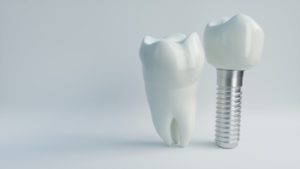
When it comes to replacing missing teeth, few options are as incredible as dental implants in Lincoln. They have become the premier option for replacing missing teeth due to their ability to replicate their likeness in terms of look, feel, and functionality. But despite their capabilities, dental implants are still able to fail—and when this happens, your oral health is jeopardized! Keep reading to learn more about why dental implants can sometimes fail, along with how the issue is ultimately treated.
Why Do Dental Implants Fail?
There are several things that can cause dental implant failure. However, most failures can be categorized into two types based on when they occur:
- Early failures – An early failure occurs within the first few months of the implant being placed, and it usually happens due to the implant still being very loose. This looseness can stem from various things such as movement during the healing process, lack of stability, oral infection, or the overall healing ability of the patient. But since early failures occur relatively soon after the implant is placed, they’re usually easy to address as the implant is often loose enough to be removed and replaced.
- Late failures – Late failures occur one year or beyond after the implant has been placed, and they’re usually a little more complicated to deal with. Sometimes an implant is placed without issue, but loses stability over time due to excess pressure, infection, or even physical trauma. Other times, the implant remains sturdy, but X-rays reveal signs of perio-implantitis, which is a disease that destroys bone matter around the base of the implant.
How Are Failed Dental Implants Addressed?
In most cases, failed implants are handled by being removed and then replaced; salvaging a failed implant is often difficult and heavily dependent on the situation, and removing the implant is usually the better option. That said, it’s important to note that some implants are more difficult to remove than others; implants in the lower jaw are usually more firm and tougher to remove. Implants that have been there for over 24 months might also be difficult to remove.
If your dentist has determined that you have a failed implant that needs removal, there are a couple of different approaches they can take. One common method involves safely cutting a small portion of your bone along the edge of the failed implant. This releases much of the built-up tension and makes the implant easier to remove. Another common method involves using a special set of tools that utilize reverse torque to remove the implant. This might sound a little nuts, but don’t worry—it’s safe, comfortable, and effective while also eliminating the need for your dentist to remove any bone.
In any case, a failed dental implant that’s extracted will need to be replaced; sometimes this can happen immediately afterwards, but usually a dental bone graft is first necessary to create a healthier site for your future implant. If you believe one of your dental implants is failing, help is available! Talk with your dentist to see what your options are for getting your smile back on track.
About the Author
The team at Olberding Dental is honored to serve the dental needs of the Lincoln area under the leadership of Dr. Louis Olberding. A Lincoln native himself, Dr. Olberding received his dental doctorate from the University of Nebraska Medical Center College of Dentistry and is a member of several professional organizations including the renowned American Dental Association. His practice is proud to offer many available services including dental implants. If you’re concerned that your dental implant might be failing, don’t hesitate to contact Olberding Dental online or over the phone: (402) 488-2325.
